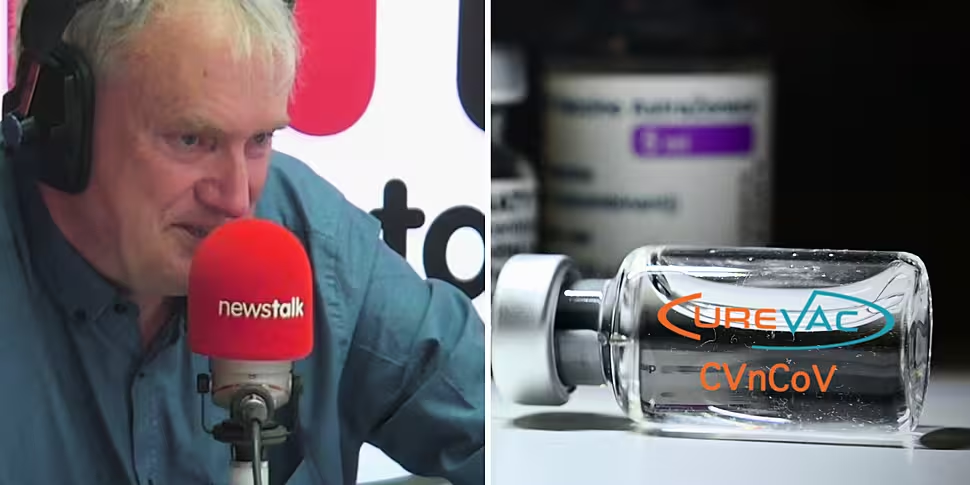Professor Luke O'Neill says German company CureVac has been left "scratching their heads" after disappointing results from their COVID-19 vaccine trial.
The firm's vaccine candidate had been seen as one of the most promising of the vaccines in development - an mRNA jab similar to the technology used by Pfizer and Moderna.
However, interim results from a major trial of 40,000 people found the vaccine had an efficacy of just 47% against COVID-19 disease of any severity.
While that's similar to the sort of efficacy seen in flu vaccines, it's significantly lower than other, already approved COVID-19 vaccines.
It "did not meet prespecified statistical success criteria", the firm said.
The German company admitted they were "hoping for a stronger interim outcome", pointing to the "unprecedented" range of variants as a possible factor.
Professor O'Neill - Professor of Biochemistry at Trinity College - told The Pat Kenny Show there are still several vaccines being tested, and sadly this is one that hasn't worked as hoped.
He explained: "It just shows these things aren't definite.
“A massive 40,000 person trial was done, and they got 47% efficacy - which is, of course, a lot lower than the gold standard, [which is] up around the 90s.
“The company themselves are scratching their heads: they spent loads of money on the trial. Why wouldn’t it work? It’s an RNA vaccine, just like Pfizer and Moderna, and yet it hasn’t hit that level.
“Mind you, 47% isn’t bad - the flu vaccine every year is about 50%. Still, in the intensely competitive world of COVID vaccines, it’s seen as a bit of a flop.”
He said the interesting scientific question is now why exactly it went wrong.
"They’re not going to give up"
CureVac will naturally be looking at whether COVID-19 variants are to blame for the lower efficacy - although both the Pfizer and Moderna vaccines have proven effective against new variants so far.
However, Professor O'Neill said there are plenty of other things they'll need to look at.
He explained: “A big one is the dose - they’re wondering if they got the dose slightly wrong, which can happen in trials. They noticed a high dose that gave a very strong antibody response had a few more side effects, in terms of the flu-like symptoms.
“They ramped the dose down, and that got a less strong antibody response than Pfizer would have achieved.
“Secondly, the RNA is slightly different… there’s a thing called uridine in the CureVac RNA, whereas it’s pseudouridine in the Pfizer one. They think that might make a difference. Of course, they’re very interested now trying to find this out.”
CureVac had also hoped their vaccine could be stored at higher temperatures than other mRNA ones, but they'll now be looking at whether those higher temperatures had a negative impact on the vaccine.
Nonetheless, Professor O'Neill said CureVac will now be going back to figure out what happened and then work to fix it.
He said: “They’ve spent a lot of effort, so they’re going to go back to the drawing kind of. Maybe put pseudouridine in… change the storage… then it might be fine.
“The EU was going to order millions of doses of this if everything went well.
"It’s also a lot cheaper, so the view was it might be of use to the developing world. They’re not going to give up… they may well be able to fix it.”
He noted that Pfizer and Moderna are ramping up production anyway, while there's been positive progress with new vaccines such as NovaVax's jab.
As a result, the disappointing CureVac results likely won't impact vaccine supplies - although it does leave Europe with an mRNA-based vaccine developed on the continent itself.









